人教版九年级全册Unit 3 Could you please tell me where the restrooms are?Section A(2d,4a-4c)课件(共58张PPT)
文档属性
| 名称 | 人教版九年级全册Unit 3 Could you please tell me where the restrooms are?Section A(2d,4a-4c)课件(共58张PPT) |
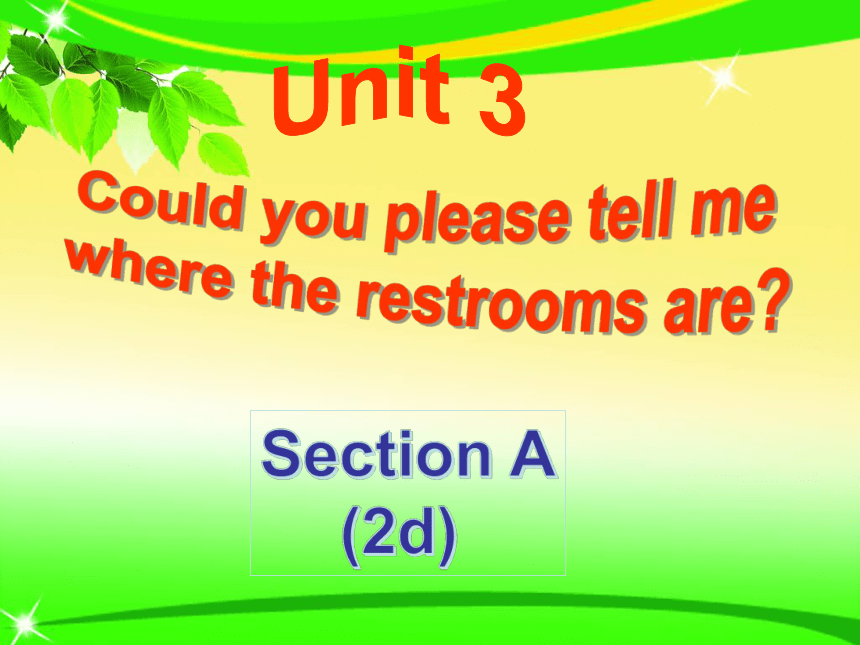
|
|
| 格式 | zip | ||
| 文件大小 | 1.4MB | ||
| 资源类型 | 教案 | ||
| 版本资源 | 人教新目标(Go for it)版 | ||
| 科目 | 英语 | ||
| 更新时间 | 2022-10-06 00:00:00 | ||
图片预览

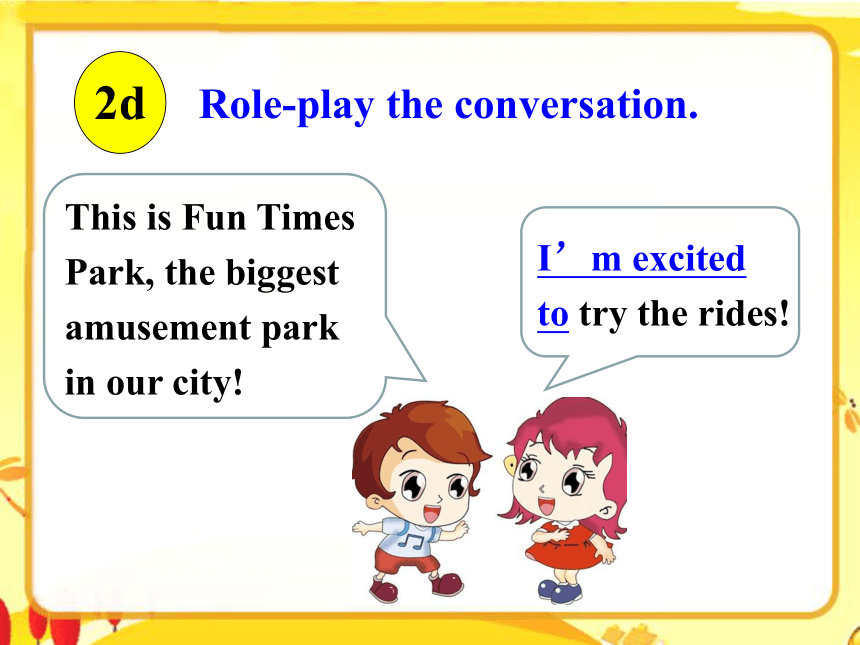
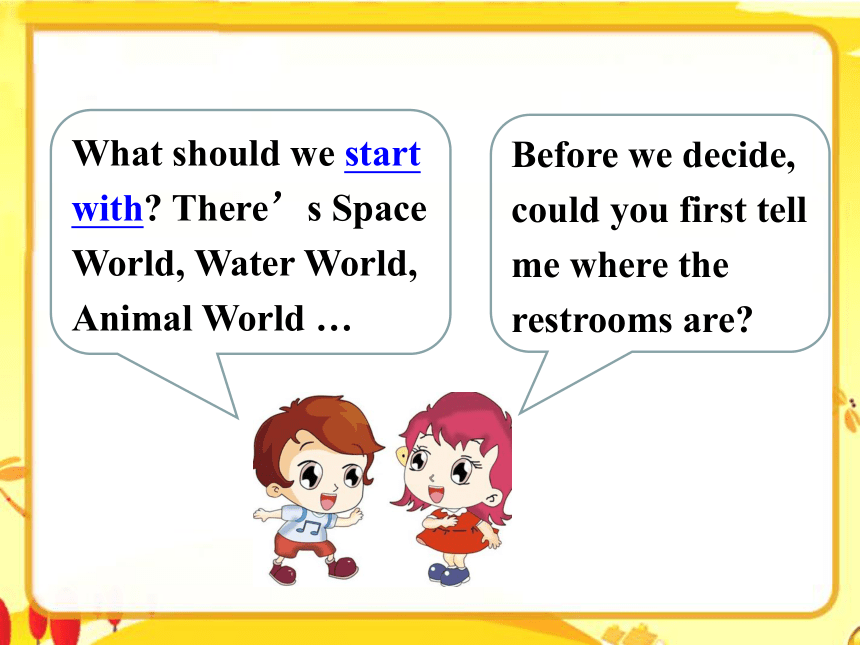
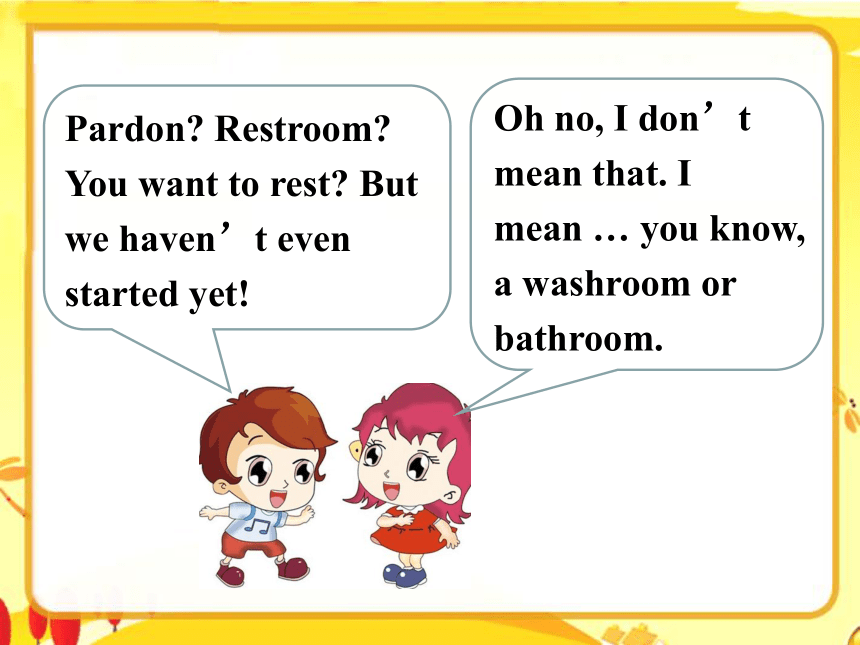

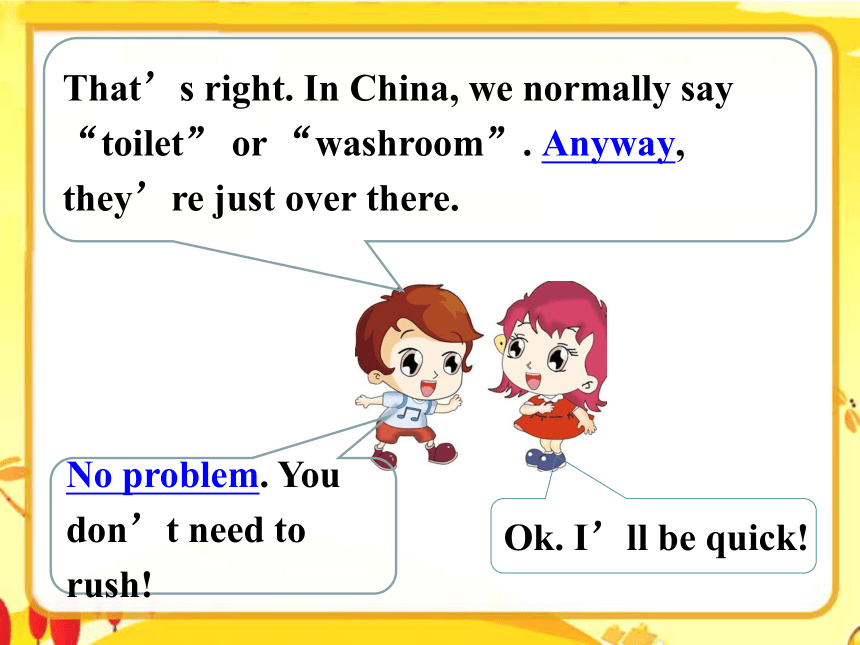
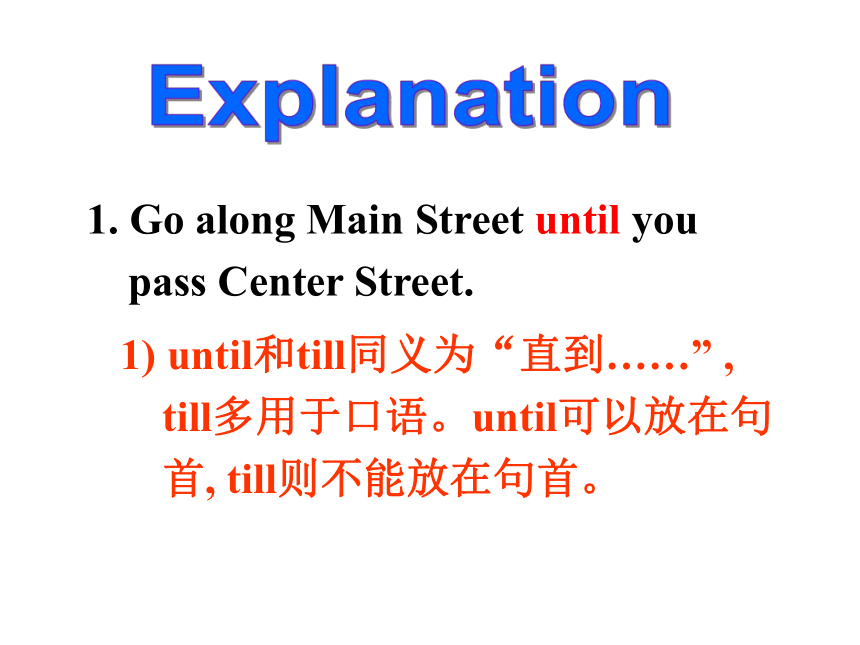
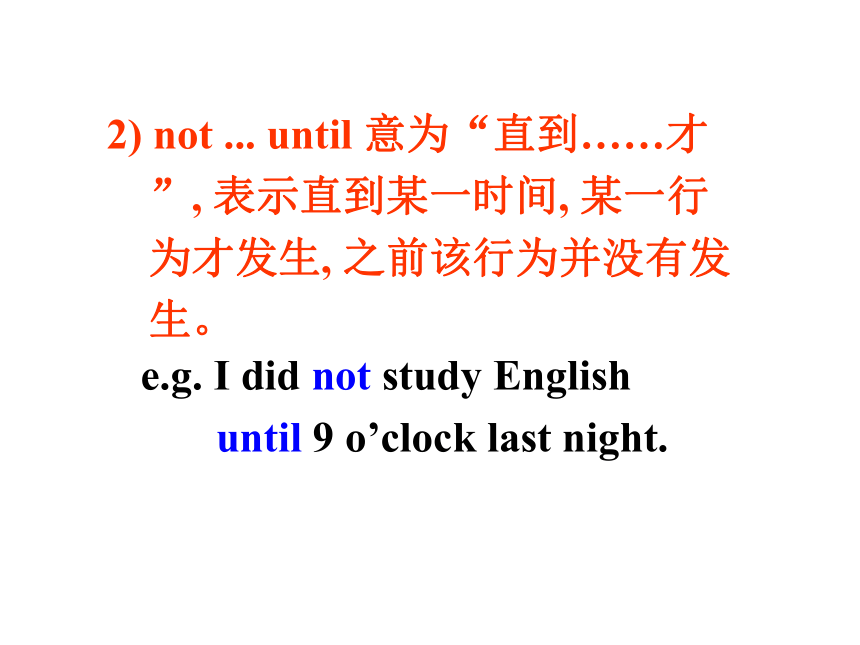
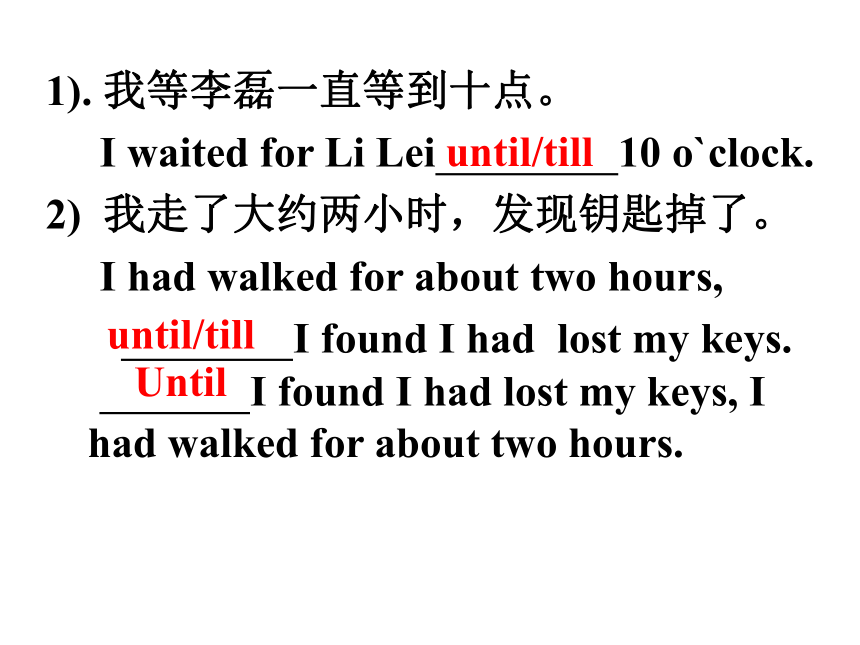
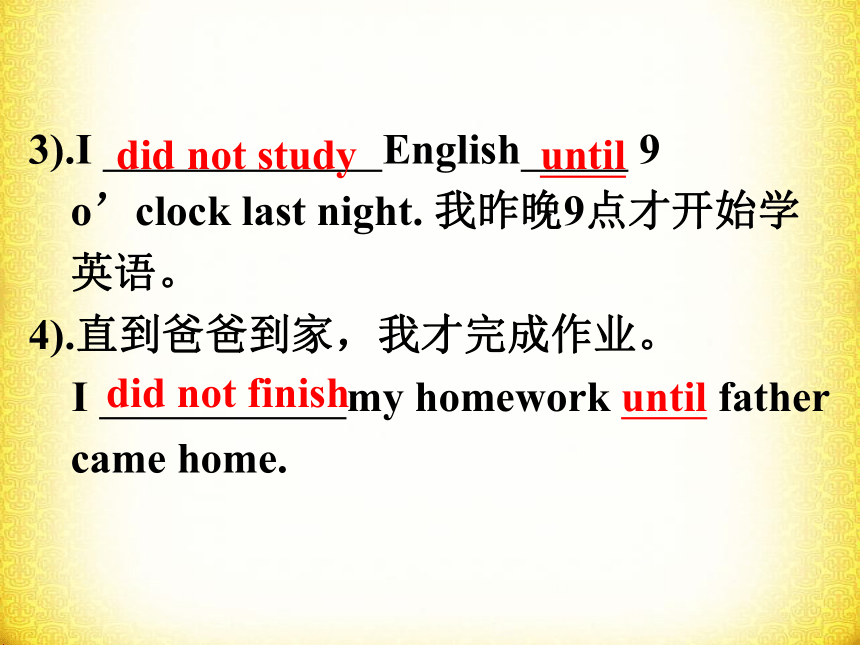
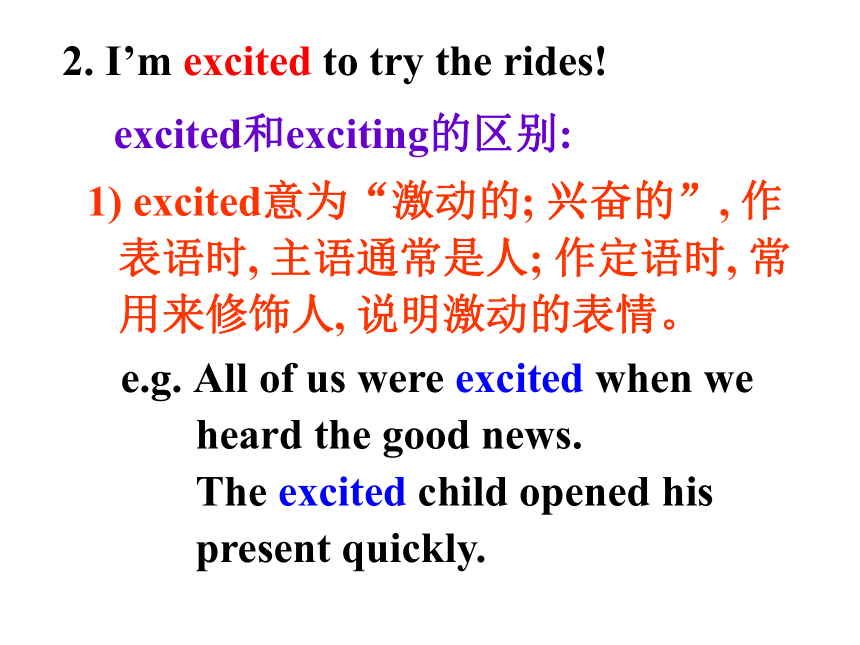
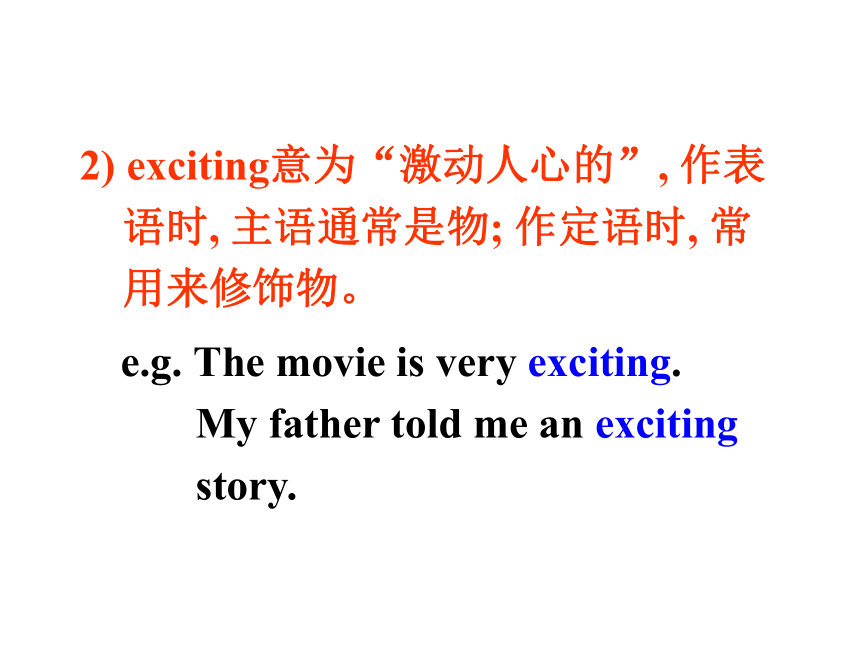
文档简介
(共58张PPT)
2d
This is Fun Times Park, the biggest amusement park in our city!
I’m excited to try the rides!
Role-play the conversation.
What should we start with There’s Space World, Water World, Animal World …
Before we decide, could you first tell me where the restrooms are
Pardon Restroom You want to rest But we haven’t even started yet!
Oh no, I don’t mean that. I mean … you know, a washroom or bathroom.
Yes! Sorry, maybe the people in China don’t often use the word “restroom” when they speak English.
Hmm … so you mean … the toilet
That’s right. In China, we normally say “toilet” or “washroom”. Anyway, they’re just over there.
No problem. You don’t need to rush!
Ok. I’ll be quick!
1. Go along Main Street until you pass Center Street.
1) until和till同义为“直到……” , till多用于口语。until可以放在句首, till则不能放在句首。
2) not ... until 意为“直到……才”, 表示直到某一时间, 某一行为才发生, 之前该行为并没有发生。
e.g. I did not study English until 9 o’clock last night.
1). 我等李磊一直等到十点。
I waited for Li Lei 10 o`clock.
2) 我走了大约两小时,发现钥匙掉了。
I had walked for about two hours,
I found I had lost my keys.
I found I had lost my keys, I had walked for about two hours.
until/till
until/till
Until
3).I English 9 o’clock last night. 我昨晚9点才开始学英语。
4).直到爸爸到家,我才完成作业。
I my homework until father came home.
did not study until
did not finish
2. I’m excited to try the rides!
excited意为“激动的; 兴奋的”, 作表语时, 主语通常是人; 作定语时, 常用来修饰人, 说明激动的表情。
e.g. All of us were excited when we
heard the good news.
The excited child opened his
present quickly.
excited和exciting的区别:
2) exciting意为“激动人心的”, 作表
语时, 主语通常是物; 作定语时, 常
用来修饰物。
e.g. The movie is very exciting.
My father told me an exciting
story.
e.g.
1). All of us were when we heard
the good news.
2).The child opened his present
quickly.
3).The movie is very .
4).My father told me an story.
5). It`s to watch the soccer match.
excited
excited
exciting
exciting
exciting
3. I’m excited to try the rides!
ride n. 供玩乐乘坐的装置
v. 骑
ride her bike
a roller coaster ride
坐过山车
How about that new ride over there
去玩一玩那边新开的骑乘项目怎么样?
4. Could you first tell me where the restrooms are
“厕所” 委婉语
restroom n. (美)
washroom; bathroom; the gent’s; men’s (room); the ladies; women’s (room); comfort room
5. Pardon Restroom You want to rest But we haven’t even started yet!
e.g. Can you pardon me for not
passing the exam, Mom
1) pardon 用作动词, 后面既可以跟宾
语, 也可以跟双宾语。
pardon sb. for doing sth.意为“原谅/宽恕某人做某事”。
2) 在没有听懂对方的话, 请对方重复
一下时也可说 pardon。
e.g. Pardon I’m sorry I can’t
follow you.
3) Pardon me 抱歉;对不起;什么,请再说一遍。
e.g.
1). 对不起我没听明白,你再说一遍好吗?
I’m sorry I can’t follow you.
2). 妈妈,我考试没及格,你能原谅我吗?
Can you the
exam, Mom
Pardon
pardon me for not passing
6. I mean … you know, a washroom or bathroom. mean 用作动词有以下含义:1) “意思是……,”(多作及物动词), 其后可跟名词或代词, 也可跟从句。
2) “意味(着)”(及物动词), 常跟名词, 有时可跟动词-ing形式或从句。
mean doing sth 意味着做…
3) “意图, 打算, 想”, 常跟动词不定式。
mean to do sth 意图做、打算做、想做
e.g.
1). Carl绝不能那样做,那意味着他的前途
完蛋了。
Carl really could not do that — it would
the end of his career.
2). 我把钱掉了,那意味着得步行回家。
I lost my money. That .
3). 抱歉!我没想伤害你。
Sorry! I you.
mean
meant walking home
never meant to hurt
7. In China, we normally say “toilet” or “washrooms” in English.
normal adj.通常的;正常的;
normally adv. 正常地; 通常地; e.g.
1). August is a slow month.
2).The patient began to breathe .
3).You shouldn`t think about the problem
in a way.
normally
normally
normal
8. You don’t need to rush!
rush v. 仓促; 急促 rush to sp冲到…
n. 仓促; 急促 in a rush匆忙地
make a rush at/for 朝……冲去 e.g.
1). They (冲到街上)the street
to see the accident.
2).他们朝门口冲去。
They the door.
3). 他匆忙赶到图书馆去。
He went to the library .
rushed to
made a rush for
in a rush
The methods of asking the way:
1. Excuse me. Where is Qiaotou Middle School
2. Excuse me. Could you tell me where Qiaotou
Middle School is
3. Excuse me. Do you know how I can get to
Qiaotou Middle School = Do you know how
to get to Qiaotou Middle School
4. Excuse me. Which is the way to Qiaotou
Middle School
1. 打扰了,你知道我在哪能买到一些药?
Excuse me, do you know where ____ _____
buy some medicine
2. 当然,顺着这条街有个超市。
Sure. There’s a supermarket the street.
3. 请你告诉我怎样到邮局好吗?
Could you please tell me _____ _____ get to
the post office
I
can
down
how to
4. 对不起,我不确定怎样到那里。
______, I am ______ ______ how to get there.
5. 你能告诉我们今晚乐队什么时候开始演奏吗?
Can you tell us ______ ____ ______ ______
playing this evening
6. 晚上8点开始。It at 8:00 p.m.
7. 我想知道接下来我们该去哪儿。
I _______ where we _______ _____ _____.
8. 你应该试试那个新的乘骑设施。
You that new ride over there.
Sorry
not sure
when the band starts
starts
wonder
should go next
should try
宾语从句的注意事项
1. 引导词及语序的变化规律
句式 引 导 词 语序
陈述句 that(口语中常省略) 不变
一般疑问句 if / whether 陈述语序
特殊疑问句 特殊疑问词 陈述语序
4a Rewrite the questions to make them more polite.
1. Where can I buy some grapes or other fruit
Could you please tell me where I can buy some grapes or other fruit
Excuse me, do you know where I can buy some grapes or other fruit
Could you please tell me where to buy some grapes or other fruit
2.How does this CD player work
Could you please tell me how this CD player works
Excuse me, do you know how this CD player works
I wonder how this CD player work s.
What time does the bank open
Could you please tell me what time the bank opens
Excuse me, do you know what time the bank opens
I wonder what time the bank opens .
.
Would you like to tell me what time the bank opens
3.How do I get to the Central Library
Could you please tell me how I get to the Central Library
Excuse me, do you know how I get to the Central Library
Could you please tell me how to get to the Central Library
I wonder how I get to the Central Library
4.Is the Italian restaurant nearby open on Monday
Could you please tell me whether\ if the Italian restaurant nearby is open on Monday
Excuse me, do you know whether\ if the Italian restaurant nearby is open on Monday
I wonder whether\ if the Italian restaurant nearby is open on Monday .
宾语从句用法
宾语从句需注意,几点事项应牢记。
一是关键引导词,不同句子词相异。
陈述句子用that;一般疑问是否(if, whether)替;
特殊问句更好办,引导还用疑问词。
二是时态常变化,主句不同从句异。主句若为现在时,从句时态应看意;主句若为过去时,从句时态向前移。
三是语序要记清,从句永保陈述序。
4b What should each person ask in the situation
1.Tim is very hungry.
Could you please tell me where I can get something to eat
Excuse me, would you mind telling me how I can get to a nearby restaurant
Pardon me, do you know if there is a restaurant around here
Could you please tell me where I can mail a letter
Excuse me, would you mind telling me how I can get to a nearby post office
Pardon me, do you know if there is a post office near here
2.Sally needs to mail a letter.
Could you please tell me where I can make a telephone call
Excuse me, would you mind telling me how I can get to a nearby payphone
Pardon me, do you know if there is a payphone near here in the neighborhood
3.Kevin would like to call his friend.
Could you please tell me when the bike shop closes
Excuse me, would you mind telling me when the bike shop closes
Pardon me, do you know when the bike shop closes
4.Helen needs to know when the bike shop closes.
Could you please tell me whether\ if there’s a bank in the shopping center
Excuse me, do you know whether\ if there’s a bank in the shopping center
I wonder whether\ if there’s a bank in the shopping center.
5.Ben is wondering if there’s a bank in the shopping center.
4c Write five questions that a tourist might ask about your city. Then role play conversations with your partner.
G1: Excuse me. Could you tell me where I can buy some stamps
Boy1: Yes, there’s a post office on Center Street.
Girl1: Oh, can you tell me where Center Street is
B1: Sure. Go past the bank. Center Street is on your right.
Girl1: Thanks a lot.
Boy1: No problem.
A: Excuse me. Would you mind telling me whether there is a hotel near here
B: Yes there is. Just go along Bridge
Street and turn left when you see the
library. Go along Long Street and it’s
on the right. It’s next to the supermarket
and across from the bank.
A: Thank you very much.
B: You’re welcome.
G2: Excuse me. Do you know where I can get money
Boy2: Sure. There is bank on Main Street.
Girl2: Oh, could you please tell me how to get there
B2: Yes…Go straight ahead. The bank is on your left.
Girl2: Thank you.
Boy2: You’re welcome.
Boy1: Excuse me. Can you tell me where I can buy some shampoo
Boy2: Yes. There’s a drug store on the second floor. Um. Let me think... Take the escalator to the second floor and then... then you turn left. Let’s see... Then go past the bank. And um... The drug store is between the furniture store and the bookstore. You should be able to get shampoo there.
Boy1: OK, great. Thanks a lot.
Boy2: You’re welcome.
A: Excuse me. Do you know where I can get a map
B: Sure. There’s a bookstore on the second floor. Take the lift to the second floor and turn right. The bookstore is next to the bank.
Tony: Hi, excuse me.
Linda: Yes. I wonder how I can help you
Tony: Could you please tell me whether\if there is a supermarket near here
Linda: Yes, there is. Go along Bridge Street and turn left at the first crossing. The supermarket is on the right.
Tony: Oh, that’s great! Thanks so much.
Linda: No problem.
LANGAGE POINTS
east, west, north, south用法要点
1. 其前通常加 the;表示在某个方位,通常介词 in。如: He lives in the south (north). 他住在南(北)方。 The sun rises in the east and sets in the west. 太阳从东方升起,从西方落下。 【注】有时也不用冠词(尤其是表示纯方位或进行反义对比时)。如:
I’m lost; which direction is south
我迷路了,哪边是南
South is opposite north on a compass.
罗盘上南与北相对。
East or west, home is best.
东好西好不如自己的家好。
2. 表示“在……的东(南,西,北)”,通常应根据情况选用不同介词in(表示在范围之内),to(表示在范围之外),on(表示毗连)。如:
China is in the east of Asia.
中国位于亚洲的东部。
Mexico is to the south of the U. S. A.
墨西哥在美国以南。
China faces the Pacific on the east.
中国东临太平洋
3. 用作副词,其前不用介词,但有时其后可接介词短语。如:
The room faces east, so we get the morning sun.
这房间朝东,所以我们上午能照到太阳。
The village lies east of the woods.
村庄位于树林东面。
比较:The village lies to the east of the woods.
4. 汉语中说“东南西北”或“东西南北”,但在英语中却要说成north, south, east and west(北南东西) 或 north, east, south andwest(北东南西),也有人说 north, east, west and south(北东西南),该说法中各词的第一个字母合起来是 news(消息)。 【注】以下各表达中,其方位习惯与汉语完全相反:northeast(东北),southeast(东南),northwest(西北),southwest(西南)
EXERCIE
( )1.How noisy the room is ! There are so many people
______in it.
A.sing B.to sing
C.singing D.song
C
( )2.Do you know______
A.what he happened
B.what the matter is with him
C.what happened to him
D.what did he happened
B
( )3.Central park is a good place_________.Let’s go there this weekend.
A.for have fun
B.have fun
C.having fun
D.to have fun
D
( )4. I love the mall. There’s always something______.
A.happened
B.happening
C.happens
D.happen
B
( )5.This interesting book only_____me ten yuan and I______ ten month reading it.
A.cost; spend
B.cost; spent
C.spends; cost
D.spent; costs
B
( )6.--Could you tell me ________
--Sorry, I don’t know. I was not at the meeting.
A. what the teacher says at the meeting
B. what the teacher said at the meeting
C. what does the teacher say at the meeting
D. what did the teacher say at the meeting
B
Revise the language items of this part.
2d
This is Fun Times Park, the biggest amusement park in our city!
I’m excited to try the rides!
Role-play the conversation.
What should we start with There’s Space World, Water World, Animal World …
Before we decide, could you first tell me where the restrooms are
Pardon Restroom You want to rest But we haven’t even started yet!
Oh no, I don’t mean that. I mean … you know, a washroom or bathroom.
Yes! Sorry, maybe the people in China don’t often use the word “restroom” when they speak English.
Hmm … so you mean … the toilet
That’s right. In China, we normally say “toilet” or “washroom”. Anyway, they’re just over there.
No problem. You don’t need to rush!
Ok. I’ll be quick!
1. Go along Main Street until you pass Center Street.
1) until和till同义为“直到……” , till多用于口语。until可以放在句首, till则不能放在句首。
2) not ... until 意为“直到……才”, 表示直到某一时间, 某一行为才发生, 之前该行为并没有发生。
e.g. I did not study English until 9 o’clock last night.
1). 我等李磊一直等到十点。
I waited for Li Lei 10 o`clock.
2) 我走了大约两小时,发现钥匙掉了。
I had walked for about two hours,
I found I had lost my keys.
I found I had lost my keys, I had walked for about two hours.
until/till
until/till
Until
3).I English 9 o’clock last night. 我昨晚9点才开始学英语。
4).直到爸爸到家,我才完成作业。
I my homework until father came home.
did not study until
did not finish
2. I’m excited to try the rides!
excited意为“激动的; 兴奋的”, 作表语时, 主语通常是人; 作定语时, 常用来修饰人, 说明激动的表情。
e.g. All of us were excited when we
heard the good news.
The excited child opened his
present quickly.
excited和exciting的区别:
2) exciting意为“激动人心的”, 作表
语时, 主语通常是物; 作定语时, 常
用来修饰物。
e.g. The movie is very exciting.
My father told me an exciting
story.
e.g.
1). All of us were when we heard
the good news.
2).The child opened his present
quickly.
3).The movie is very .
4).My father told me an story.
5). It`s to watch the soccer match.
excited
excited
exciting
exciting
exciting
3. I’m excited to try the rides!
ride n. 供玩乐乘坐的装置
v. 骑
ride her bike
a roller coaster ride
坐过山车
How about that new ride over there
去玩一玩那边新开的骑乘项目怎么样?
4. Could you first tell me where the restrooms are
“厕所” 委婉语
restroom n. (美)
washroom; bathroom; the gent’s; men’s (room); the ladies; women’s (room); comfort room
5. Pardon Restroom You want to rest But we haven’t even started yet!
e.g. Can you pardon me for not
passing the exam, Mom
1) pardon 用作动词, 后面既可以跟宾
语, 也可以跟双宾语。
pardon sb. for doing sth.意为“原谅/宽恕某人做某事”。
2) 在没有听懂对方的话, 请对方重复
一下时也可说 pardon。
e.g. Pardon I’m sorry I can’t
follow you.
3) Pardon me 抱歉;对不起;什么,请再说一遍。
e.g.
1). 对不起我没听明白,你再说一遍好吗?
I’m sorry I can’t follow you.
2). 妈妈,我考试没及格,你能原谅我吗?
Can you the
exam, Mom
Pardon
pardon me for not passing
6. I mean … you know, a washroom or bathroom. mean 用作动词有以下含义:1) “意思是……,”(多作及物动词), 其后可跟名词或代词, 也可跟从句。
2) “意味(着)”(及物动词), 常跟名词, 有时可跟动词-ing形式或从句。
mean doing sth 意味着做…
3) “意图, 打算, 想”, 常跟动词不定式。
mean to do sth 意图做、打算做、想做
e.g.
1). Carl绝不能那样做,那意味着他的前途
完蛋了。
Carl really could not do that — it would
the end of his career.
2). 我把钱掉了,那意味着得步行回家。
I lost my money. That .
3). 抱歉!我没想伤害你。
Sorry! I you.
mean
meant walking home
never meant to hurt
7. In China, we normally say “toilet” or “washrooms” in English.
normal adj.通常的;正常的;
normally adv. 正常地; 通常地; e.g.
1). August is a slow month.
2).The patient began to breathe .
3).You shouldn`t think about the problem
in a way.
normally
normally
normal
8. You don’t need to rush!
rush v. 仓促; 急促 rush to sp冲到…
n. 仓促; 急促 in a rush匆忙地
make a rush at/for 朝……冲去 e.g.
1). They (冲到街上)the street
to see the accident.
2).他们朝门口冲去。
They the door.
3). 他匆忙赶到图书馆去。
He went to the library .
rushed to
made a rush for
in a rush
The methods of asking the way:
1. Excuse me. Where is Qiaotou Middle School
2. Excuse me. Could you tell me where Qiaotou
Middle School is
3. Excuse me. Do you know how I can get to
Qiaotou Middle School = Do you know how
to get to Qiaotou Middle School
4. Excuse me. Which is the way to Qiaotou
Middle School
1. 打扰了,你知道我在哪能买到一些药?
Excuse me, do you know where ____ _____
buy some medicine
2. 当然,顺着这条街有个超市。
Sure. There’s a supermarket the street.
3. 请你告诉我怎样到邮局好吗?
Could you please tell me _____ _____ get to
the post office
I
can
down
how to
4. 对不起,我不确定怎样到那里。
______, I am ______ ______ how to get there.
5. 你能告诉我们今晚乐队什么时候开始演奏吗?
Can you tell us ______ ____ ______ ______
playing this evening
6. 晚上8点开始。It at 8:00 p.m.
7. 我想知道接下来我们该去哪儿。
I _______ where we _______ _____ _____.
8. 你应该试试那个新的乘骑设施。
You that new ride over there.
Sorry
not sure
when the band starts
starts
wonder
should go next
should try
宾语从句的注意事项
1. 引导词及语序的变化规律
句式 引 导 词 语序
陈述句 that(口语中常省略) 不变
一般疑问句 if / whether 陈述语序
特殊疑问句 特殊疑问词 陈述语序
4a Rewrite the questions to make them more polite.
1. Where can I buy some grapes or other fruit
Could you please tell me where I can buy some grapes or other fruit
Excuse me, do you know where I can buy some grapes or other fruit
Could you please tell me where to buy some grapes or other fruit
2.How does this CD player work
Could you please tell me how this CD player works
Excuse me, do you know how this CD player works
I wonder how this CD player work s.
What time does the bank open
Could you please tell me what time the bank opens
Excuse me, do you know what time the bank opens
I wonder what time the bank opens .
.
Would you like to tell me what time the bank opens
3.How do I get to the Central Library
Could you please tell me how I get to the Central Library
Excuse me, do you know how I get to the Central Library
Could you please tell me how to get to the Central Library
I wonder how I get to the Central Library
4.Is the Italian restaurant nearby open on Monday
Could you please tell me whether\ if the Italian restaurant nearby is open on Monday
Excuse me, do you know whether\ if the Italian restaurant nearby is open on Monday
I wonder whether\ if the Italian restaurant nearby is open on Monday .
宾语从句用法
宾语从句需注意,几点事项应牢记。
一是关键引导词,不同句子词相异。
陈述句子用that;一般疑问是否(if, whether)替;
特殊问句更好办,引导还用疑问词。
二是时态常变化,主句不同从句异。主句若为现在时,从句时态应看意;主句若为过去时,从句时态向前移。
三是语序要记清,从句永保陈述序。
4b What should each person ask in the situation
1.Tim is very hungry.
Could you please tell me where I can get something to eat
Excuse me, would you mind telling me how I can get to a nearby restaurant
Pardon me, do you know if there is a restaurant around here
Could you please tell me where I can mail a letter
Excuse me, would you mind telling me how I can get to a nearby post office
Pardon me, do you know if there is a post office near here
2.Sally needs to mail a letter.
Could you please tell me where I can make a telephone call
Excuse me, would you mind telling me how I can get to a nearby payphone
Pardon me, do you know if there is a payphone near here in the neighborhood
3.Kevin would like to call his friend.
Could you please tell me when the bike shop closes
Excuse me, would you mind telling me when the bike shop closes
Pardon me, do you know when the bike shop closes
4.Helen needs to know when the bike shop closes.
Could you please tell me whether\ if there’s a bank in the shopping center
Excuse me, do you know whether\ if there’s a bank in the shopping center
I wonder whether\ if there’s a bank in the shopping center.
5.Ben is wondering if there’s a bank in the shopping center.
4c Write five questions that a tourist might ask about your city. Then role play conversations with your partner.
G1: Excuse me. Could you tell me where I can buy some stamps
Boy1: Yes, there’s a post office on Center Street.
Girl1: Oh, can you tell me where Center Street is
B1: Sure. Go past the bank. Center Street is on your right.
Girl1: Thanks a lot.
Boy1: No problem.
A: Excuse me. Would you mind telling me whether there is a hotel near here
B: Yes there is. Just go along Bridge
Street and turn left when you see the
library. Go along Long Street and it’s
on the right. It’s next to the supermarket
and across from the bank.
A: Thank you very much.
B: You’re welcome.
G2: Excuse me. Do you know where I can get money
Boy2: Sure. There is bank on Main Street.
Girl2: Oh, could you please tell me how to get there
B2: Yes…Go straight ahead. The bank is on your left.
Girl2: Thank you.
Boy2: You’re welcome.
Boy1: Excuse me. Can you tell me where I can buy some shampoo
Boy2: Yes. There’s a drug store on the second floor. Um. Let me think... Take the escalator to the second floor and then... then you turn left. Let’s see... Then go past the bank. And um... The drug store is between the furniture store and the bookstore. You should be able to get shampoo there.
Boy1: OK, great. Thanks a lot.
Boy2: You’re welcome.
A: Excuse me. Do you know where I can get a map
B: Sure. There’s a bookstore on the second floor. Take the lift to the second floor and turn right. The bookstore is next to the bank.
Tony: Hi, excuse me.
Linda: Yes. I wonder how I can help you
Tony: Could you please tell me whether\if there is a supermarket near here
Linda: Yes, there is. Go along Bridge Street and turn left at the first crossing. The supermarket is on the right.
Tony: Oh, that’s great! Thanks so much.
Linda: No problem.
LANGAGE POINTS
east, west, north, south用法要点
1. 其前通常加 the;表示在某个方位,通常介词 in。如: He lives in the south (north). 他住在南(北)方。 The sun rises in the east and sets in the west. 太阳从东方升起,从西方落下。 【注】有时也不用冠词(尤其是表示纯方位或进行反义对比时)。如:
I’m lost; which direction is south
我迷路了,哪边是南
South is opposite north on a compass.
罗盘上南与北相对。
East or west, home is best.
东好西好不如自己的家好。
2. 表示“在……的东(南,西,北)”,通常应根据情况选用不同介词in(表示在范围之内),to(表示在范围之外),on(表示毗连)。如:
China is in the east of Asia.
中国位于亚洲的东部。
Mexico is to the south of the U. S. A.
墨西哥在美国以南。
China faces the Pacific on the east.
中国东临太平洋
3. 用作副词,其前不用介词,但有时其后可接介词短语。如:
The room faces east, so we get the morning sun.
这房间朝东,所以我们上午能照到太阳。
The village lies east of the woods.
村庄位于树林东面。
比较:The village lies to the east of the woods.
4. 汉语中说“东南西北”或“东西南北”,但在英语中却要说成north, south, east and west(北南东西) 或 north, east, south andwest(北东南西),也有人说 north, east, west and south(北东西南),该说法中各词的第一个字母合起来是 news(消息)。 【注】以下各表达中,其方位习惯与汉语完全相反:northeast(东北),southeast(东南),northwest(西北),southwest(西南)
EXERCIE
( )1.How noisy the room is ! There are so many people
______in it.
A.sing B.to sing
C.singing D.song
C
( )2.Do you know______
A.what he happened
B.what the matter is with him
C.what happened to him
D.what did he happened
B
( )3.Central park is a good place_________.Let’s go there this weekend.
A.for have fun
B.have fun
C.having fun
D.to have fun
D
( )4. I love the mall. There’s always something______.
A.happened
B.happening
C.happens
D.happen
B
( )5.This interesting book only_____me ten yuan and I______ ten month reading it.
A.cost; spend
B.cost; spent
C.spends; cost
D.spent; costs
B
( )6.--Could you tell me ________
--Sorry, I don’t know. I was not at the meeting.
A. what the teacher says at the meeting
B. what the teacher said at the meeting
C. what does the teacher say at the meeting
D. what did the teacher say at the meeting
B
Revise the language items of this part.
同课章节目录
- Unit 1 How can we become good learners.
- Section A
- Section B
- Unit 2 I think that mooncakes are delicious!
- Section A
- Section B
- Unit 3 Could you please tell me where the restroom
- Section A
- Section B
- Unit 4 I used to be afraid of the dark.
- Section A
- Section B
- Unit 5 What are the shirts made of?
- Section A
- Section B
- Review of Units 1-5
- Unit 6 When was it invented?
- Section A
- Section B
- Unit 7 Teenagers should be allowed to choose their
- Section A
- Section B
- Unit 8 It must belong to Carla.
- Section A
- Section B
- Unit 9 I like music that I can dance to.
- Section A
- Section B
- Unit 10 You're supposed to shake hands.
- Section A
- Section B
- Review of Units 6-10
- Unit 11 Sad movies make me cry.
- Section A
- Section B
- Unit 12 Life is full of the unexpected
- Section A
- Section B
- Unit 13 We're trying to save the earth!
- Section A
- Section B
- Unit 14 I remember meeting all of you in Grade 7.
- Section A
- Section B
- Review of Units 11-14
